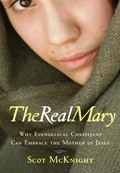 In The Real Mary: Why Evangelical Christians Can Embrace the Mother of Jesus, Dr. Scot McKnight takes a close look at who Mary was & why she is important. McKnight looks at her life, her words & her action & portrays her as a real girl, a real mother, a real person. McKnight claims that the real story of Mary has never been told – her story has been skewed by theological controversy, among other things.
In The Real Mary: Why Evangelical Christians Can Embrace the Mother of Jesus, Dr. Scot McKnight takes a close look at who Mary was & why she is important. McKnight looks at her life, her words & her action & portrays her as a real girl, a real mother, a real person. McKnight claims that the real story of Mary has never been told – her story has been skewed by theological controversy, among other things.Often in Protestant circles, Mary is looked at as a Catholic icon, or, more often than not, not even thought about. McKnight believes that the story of who Mary truly was is important, if for no other reason, because she always leads us to Jesus.
Dr. McKnight spends the first two-thirds of the book looking in-depth at all the biblical records of Mary, speaking significantly to her Magnificat. Dr. McKnight describes her, among other things, as a woman of sorrow, of danger, of justice, & a woman of influence. In these descriptors, Dr. McKnight fleshes out a portrait of Mary many evangelicals have not seen before.
 One adjective I never would have applied to Mary is that of revolutionary. However, Dr. McKnight, in reading the Magnificat, labels her as such. Dr. McKnight mentions Lynne Hybels book, Nice Girls Don’t Change the World (reviewed earlier), & puts Mary solidly in that camp as not a “nice” girl (If “nice” means meak & mild & mind-your-own-business). Mary, in her Magnificat, takes on heads of state & challenges mindsets. I would never have labeled her as such, mainly because I hadn’t thought much about her, for one, & second, because I did think of her as a “nice” girl. Dr. McKnight also doesn’t like how Mary has been typically represented somber-faced & emotionless. Mary was a passionate, vibrant woman.
One adjective I never would have applied to Mary is that of revolutionary. However, Dr. McKnight, in reading the Magnificat, labels her as such. Dr. McKnight mentions Lynne Hybels book, Nice Girls Don’t Change the World (reviewed earlier), & puts Mary solidly in that camp as not a “nice” girl (If “nice” means meak & mild & mind-your-own-business). Mary, in her Magnificat, takes on heads of state & challenges mindsets. I would never have labeled her as such, mainly because I hadn’t thought much about her, for one, & second, because I did think of her as a “nice” girl. Dr. McKnight also doesn’t like how Mary has been typically represented somber-faced & emotionless. Mary was a passionate, vibrant woman.The last third of the book, Dr. McKnight attempts to reconcile the differences between Catholics & Protestants. Dr. McKnight views each of the main Catholic teachings regarding Mary & interacts with them from a Protestant viewpoint. I found this section quite helpful to know exactly what Catholic Mariology truly is. I have heard all sorts of crazy things & was glad to see what Catholic thought on Mary really is.
Last, Dr. McKnight suggests a Protestant day for Mary, one in which we celebrate Mary & the important role she has played in our faith. An interesting idea, for sure, & one I would like to explore thought on more. In an interview I conducted with Dr. McKnight, I asked him to round out his vision for that.
Overall, a fascinating read & also quite a provocative one. I would highly recommend this book. You can pick up a copy here for 20% off.





No comments:
Post a Comment